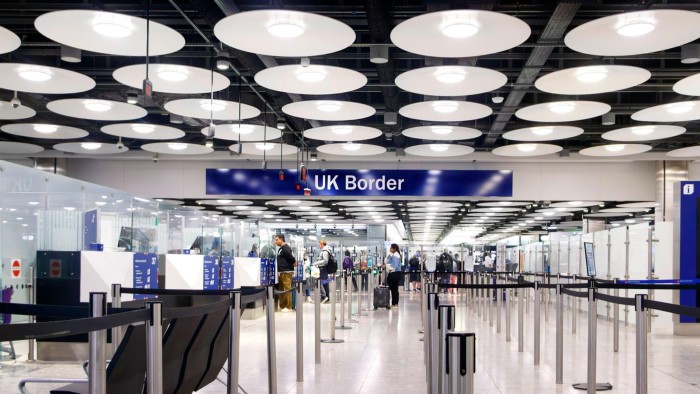Unlock the Editor’s Digest for free
Roula Khalaf, Editor of the FT, selects her favourite stories in this weekly newsletter.
Ministers cannot justify the high income threshold set for British people to bring a partner to the country on a family visa, according to the government’s migration advisers.
The Migration Advisory Committee said on Tuesday there was no rationale behind the current minimum income requirement of £29,000 for spouse and partner visas, which was set by the previous Conservative government with reference to the salary thresholds for skilled workers.
This threshold — which applies mainly to British citizens and settled residents who want to bring a partner to the UK — is already among the highest in the advanced world, rivalled only by Norway among countries the MAC compared.
It was originally set to rise still further to £38,700 under the Tories’ plans, meaning that most British citizens would not earn enough to sponsor a foreign partner, and making it one of the most contentious elements of a broader clampdown on legal migration.
“Given the family route that we are reviewing has a completely different objective and purpose to the work route, we do not understand the rationale for the threshold being set using this method,” the MAC said in a report.
Family separations caused by the income requirements had “the capacity to inflict severe and lasting damage on British and settled people’s families”, it added, citing evidence of mental health problems among British children separated from one of their parents and difficulty establishing meaningful parental relationships.
Income requirements in a range of £24,000-£28,000 could be justified, if ministers wanted to ensure families could support themselves without calling on taxpayers, the committee said.
There could still be a net cost to taxpayers, since many partners would not earn enough over their lifetime to cover their use of public services, it cautioned.
But this would also be true of many British families “who would be considered to have a good standard of living and are perfectly able to support themselves with their incomes”, the MAC added.
Last year, the newly elected Labour government put previous proposals on hold and asked the MAC to advise on how to set income requirements, balancing “economic wellbeing” with family life, as part of broader reforms of the framework for family migration it planned to set out by the end of the year.
According to the immigration white paper published last month, the new system will “ensure the family unit has sufficient money” to avoid calls on taxpayers, while also guarding against forced marriage, and ensuring new arrivals spoke sufficient English to integrate.
Ministers have said they want to cut the numbers arriving through family visa routes, as well as through work and humanitarian channels, arguing that courts are deciding too many family-related immigration cases on the basis that they are “‘exceptional’ to the normal rules”.
However, family routes account for a relatively small proportion of overall net migration, with just over 86,000 family visas granted in 2024, of which about two-thirds were for a partner.
The MAC said lowering the minimum income requirement to about £24,000 could be expected to increase net migration by up to 8,000 — roughly 1-3 per cent of projected future net migration.
Overall net migration almost halved from 860,000 in 2023 to 421,000 in 2024, according to official figures.




